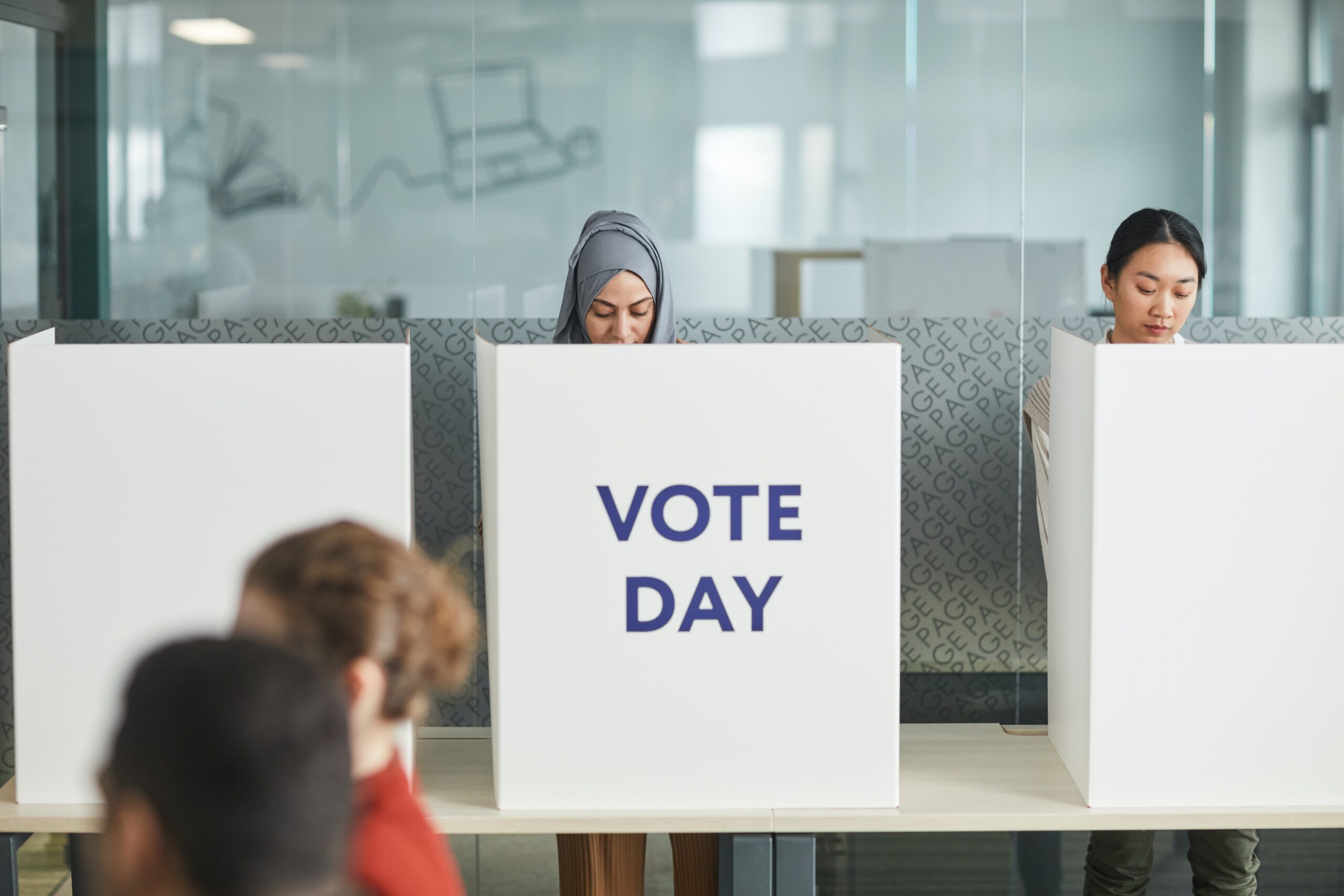Based on the polling and political punditry that have dominated media headlines recently, last week’s election brought a host of surprises. As one critical race heads to a runoff and others may be subject to recounts, the full results and implications of this election will take weeks to unfold. While the remaining votes are counted, we at IWPR – like so many across the country – are taking stock of what this election means for us, our priorities, our work, and our lives.
As of writing, votes are still being tallied in several races, but it is now clear that Democrats will hold the Senate while Republicans will take control in the House of Representatives. This shift in power has huge implications for the prospects of movement on major legislative initiatives – including key IWPR priorities like pay equity, workplace protections, abortion rights, and childcare access. The incoming Congress will also face perennial challenges that are part of the business of governing, including passing government funding bills – basic legislative functions that could become even more contentious if the election ultimately yields a new division of power.
As the final makeup of the 118th Congress comes into focus, it’s clear that voters were driven by concerns about the economy and about the future of abortion access – both issues critical to IWPR’s mission to advance gender equity.
In all five states where questions of abortion access were on the ballot, voters acted to protect reproductive rights. In California, Michigan, and Vermont, voters backed ballot measures that enshrined protections for abortion in the state constitution. In both Vermont and California, the measures backstop laws already on the books protecting abortion access before viability – these states both already rank highly in IWPR’s Reproductive Rights Index (a measure of the impacts of abortion bans and restrictions). In Michigan, the measure will block enforcement of the state’s pre-Roe ban, which remains on the books, providing critical protection of abortion access in the state.
Elsewhere, efforts to further restrict abortion were soundly defeated. In Kentucky, voters rejected a constitutional amendment denying a right to abortion, echoing how a similar proposal met the same fate in neighboring Kansas in August 2022. It’s particularly noteworthy to see the ballot measure fail in Kentucky, which has a spate of extremely restrictive abortion laws on the books and where abortion is now banned outright. In Montana, voters also rejected a state law that would have required political interference in certain reproductive health decisions.
Beyond these five states, voters across the country sent a clear message to their leaders that abortion access is critical to their lives – as is an economic future that leaves no one behind. Nationally, exit polls indicated that 27% of voters said that abortion was the top issue driving their vote, second only to inflation (32%). It trended even higher in some politically key states: in Michigan, for example, abortion was the top issue for 45% of voters, a percentage almost double the next highest issue (inflation, at 28%). State and federal legislators need look no further than these numbers to know that they need to take action to protect abortion access and to build an economy that works for everyone.
If the House of Representatives does shift hands, the next few weeks – popularly known as the lame duck session – becomes even more important. The current congress must complete work on a number of still-pending legislative priorities before the end of the year. A key priority of IWPR is Senate passage of the Pregnant Workers’ Fairness Act, legislation already passed by the House of Representatives that would guarantee reasonable workplace accommodations for pregnant and postpartum workers. Despite House action and bipartisan Senate support, this important legislation is poised to die unless the Senate takes swift action.
Similarly, as the balance of power in Congress shifts, the Senate will have to provide a bulwark against legislative attacks on women’s health and rights, while the Biden Administration utilizes the full potential of executive action to continue to prioritize gender and racial equity, and economic progress. Many of the Biden Administration’s economic goals, originally included in the Build Back Better package, fell short of the finish line during the current session of Congress; with Tuesday’s election results, it’s now more important than ever that the President look to executive action to get these priorities across the finish line.
If partisan gridlock is increasingly likely at the federal level, then state action becomes more important than ever. The 2022 election yielded a range of state outcomes (each of which is worthy of independent analysis) and the prospects for real progress certainly vary state to state, but across the board Tuesday’s election underscores that, for millions of Americans, the best prospects for policy change may come from their state capitals, not from Washington. As attention turns to state and local government as the potential engine of progress, it’s noteworthy that record numbers of women ran for governor and state legislatures this cycle.
In the coming days and months, much will be written about this election – the political dynamics, issues that drove voters, and what it means for Washington. In the immediate aftermath, it’s clear that issues of economic recovery, together with the push toward reproductive justice that was only amplified by the fall of Roe, played a critical role in motivating voters. Regardless of the party that controls Congress, IWPR is committed to continuing to work to advance these issues – to promote federal and state policy that promotes economic equity and the full participation of women in the economy and in society, and policy that is based on facts, evidence, and the realities of women’s lives.


